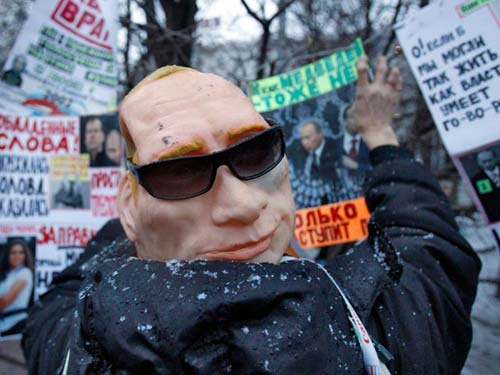Putin-Media: (In)decisive Confrontation
Each era has its own peculiar media wars. The recent attacks by the regime on the independent media – or at least those which aspire to – is like using a sledgehammer to crack a nut compared to the wars that were waged against the media by the Kremlin a decade ago.
February 27, 2012 -
Andrzej Brzeziecki
-
Articles and Commentary

putin_media.jpg
In recent weeks, state inspectors entered the bank belonging to Alexander Lebedev, co-owner of the Russian newspaper Novaya Gazeta. Their activities destabilised the functioning of the bank to such an extent that it is unable to finance the journalists’ work. And the result is that the last big liberal Russian newspaper is on the verge of collapse. Very clever, being able to achieve the goal without attacking the editors themselves!
The main shareholder of the Echo of Moscow radio station, Gazprom, has introduced changes in the governing board, constricting the powers of Alexei Venediktov. This happened right after Vladimir Putin accused the radio of pouring scorn on him every day (we shall refrain from quoting the exact phrase). State prosecutors also became interested in who financed broadcasts of the demonstrations after the December 2011 elections to the Duma by the internet television Dozhd. And so on, and so forth – not to mention smaller incidents such as the removal of the show hosted by Kseniya Sobchak from the MTV programming schedule.
Trying to bring down a newspaper which is only available in the big cities rather than the whole of Russia, pressuring a radio station which already had to be cautious because of its ownership structure, and using state prosecutors to harass an internet television station – all this means that the regime is anxious and not certain of Putin’s seemingly easy victory next month. Trying to kill whatever is still left of free speech in Russia is quite sad.
At the same time it is obvious that the Kremlin will not be able to win this war. It is focused on those in the media who are by no means the most dangerous for the regime. Novaya Gazeta and Echo of Moscow have been repeating the same old tune for years, and still the demonstrations continue to take place on a scale which has not been previously seen in Russia. And it wasn’t the Dozhd television station which brought the people out. Putin is warring against the traditional media but is unable to put down the thousands of internet users who are actually leading the demonstrations. The scores of “live journals”, blogs, internet parodies and social networks are uniting citizens in their protests against the abuses of power. And this is something that Putin and his people will be unable to stamp out.
A Russia without Novaya Gazeta (let us hope that it will not come to that!), and with the Echo of Moscow completely subordinated to the Kremlin would be a much worse place. But it is doubtful if this would make Vladimir Putin sleep any easier.
Translated by Tomasz Bieroń
Andrzej Brzeziecki is the Editor-in-Chief of New Eastern Europe and Nowa Europa Wschodnia.


































